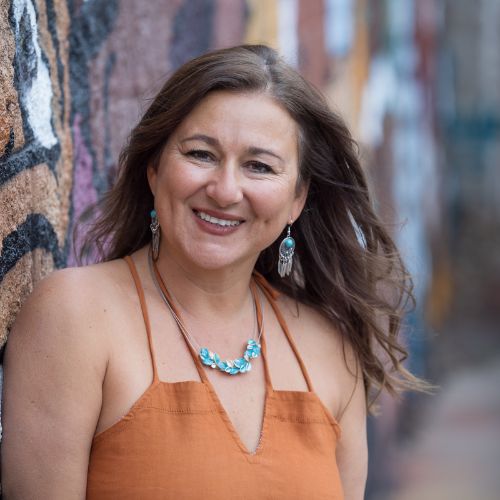I am thrilled today to introduce you to two young people I’ve had the joy of working with this summer.
Hope Muñoz is a University of Colorado senior from New Mexico. Jinx Wilson, who identifies as nonbinary, is a Fort Collins native and a junior at Metropolitan State University.
Hope says she was the kind of kid who never stopped asking why. “I had a new question for every answer that was given.” Jinx was always writing. “I carried a specific notebook I would always have on me and wrote all my stories.”
Those traits led each of them to pursue the same dream: Journalism. They both want to become reporters.
Hope and Jinx are participating in a first-of-its-kind in Colorado intern training program for students from diverse backgrounds. As COLab’s community engagement coordinator working directly with these young people, I can’t tell you how much they have inspired me.
The Workforce Pathways program has twin goals: to help newsrooms develop thriving and inclusive internship programs for journalism students, and to help the interns — who in these days of remote newsrooms are often isolated — with training and peer and professional support. That support includes pay. For years, many newsrooms offered unpaid internships, which excluded students who could not afford to work for free.
The overall mission is to help Colorado diversify its largely white newsrooms by growing the pool of future journalists.
“We need more diversity in the field of journalism so we can accurately reflect all communities and viewpoints,” Hope said. “… People from diverse backgrounds don’t often get as many opportunities as others so we need to make sure we are providing them with the tools they need to succeed.”
The intern program is another way that COLab, Colorado Media Project (CMP) and the Colorado Press Association (CPA) are responding to the call of community members and journalists of color who told us that strong local news demands greater diversity in newsroom staffing and in coverage. These Black, Latinx, Asian, South Asian, Native Hawaiian, Pacific Islander and Indigenous Coloradans, who participated in the COLab-CMP Voices Initiative to rebuild trust between newsrooms and communities of color, recommended more paid internships and fellowships for students who come from underrepresented groups.
To that end, CMP awarded four newsrooms — The Sentinel in Aurora, Bucket List Community Cafe in north Denver, the Boulder Reporting Lab and KGNU Community Radio — a combined total of $45,000 to support paid internship programs. COLab and the Press Association, with additional financial support from the Media Project, are supporting these and other newsrooms and their interns with hands-on guidance and training.
We have brought in working journalists to talk to the interns about the connection between journalism and democracy, guide them through the dos and don’ts of interviewing, the best practices for reporting on equity, and how to use data to enhance their reporting. With just four weeks to go, we have a full agenda ahead.
This summer, Hope is working for the Boulder Reporting Lab and Jinx is reporting for KGNU in Denver. Joining them in the program are fellow interns Shannon Tyler at Colorado Newsline, Siler Stein, Jonathan Peter, Ryland Scholes, Maddie Lindsay, Patricca Serrano-Bunn and Jackie Ramirez at the Bucket List Community Cafe, Irl Paulalengan at Sentinel Colorado, Sara Martin at Chalkbeat, Skylar Hew at CU’s MedLab, Parker Yamasaki and Ciara Zavala at The Colorado Sun, Por Jaijongkit, Kira Kizzo, Ivonne Olivas and Juanita Hurtado at KGNU.
You can tell by their names just how diverse this inaugural class is. And that, again, is the point.
“I think it’s important for people to be able to hear perspectives from a wide variety of individuals so that they’re not getting the same ‘narrative’ time and time again,” Jinx told me. “It’s important to diversify yourself and expose yourself to all different kinds of people and ideas, particularly in journalism where the work is so important and impactful.”
Helping these young people, learning from them, carrying out the vision of the Voices Initiative, is not just a professional passion for me, it is a personal one. I share a similar background. I am a Latina, a multi-ethnic immigrant from Ecuador, and I have struggled with being the only or one of few women of color in my newsroom. I know how vital it is to create news organizations that represent the communities they cover, and how critical that representation is to building the kind of trust that strengthens local news.
These young people symbolize the promise of future newsrooms where we’re not talking about diversity, equity and inclusion. We’re just doing it.
This post was sent as a letter to our email subscribers on Thursday, July 20, 2023. It was updated on Aug. 23 to remove a phrase identifying Hope Munoz as Latina. She is not. Join our email list to learn more about COLab and the work we are doing.




